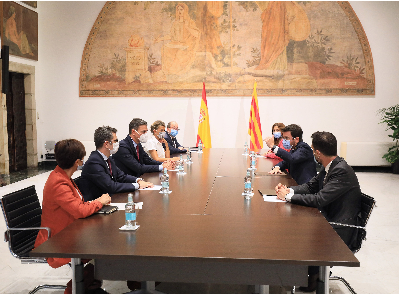- The head of the Executive emphasized that "beyond very specific deadlines, the most important thing are the progress made to date".
- He assured that "today we have achieved what we were demanding and did not seem possible: that the Spanish State sits down at a negotiating table to begin to address the political conflict".
- Pere Aragonès insisted that the position of the Government of Catalonia at the table is "amnesty, to end the repression that has not ceased," and the holding of a referendum.

The president of the Government of Catalonia, Pere Aragonès, has assured this afternoon that "today is an important day for Catalonia", because "we are restarting the negotiation process, which must have the continuity that should allow us to move towards a democratic resolution of the conflict between Catalonia and the Spanish State".
The head of the Executive has appeared before the media from the Gothic Gallery of the Government of Catalonia palace, after the restart of the negotiating table between the governments of Catalonia and the Spanish State. Pere Aragonés pointed out that today's meeting "is not a second meeting, but a restart of the negotiation process, after a long inactivity due to the pandemic, but also to the repression that has not ceased and that led to the disqualification of the president of Catalonia".
In this line, he stressed that "today we achieve what we demanded and did not seem possible: that the Spanish State sits down at a negotiating table to begin to address the political conflict from the mutual institutional recognition as political subjects". "The majority clamor of the Catalan society, which filled the streets asking for the sit and talk, begins to become a reality", he reiterated.
President Aragonès insisted that the position of the Government of Catalonia at the table is "amnesty to end the repression that has not ceased", and the holding of "a referendum so that the political future of Catalonia can be decided by its citizens". And he assured that the "referendum is the most inclusive proposal", because "it allows everyone to defend their position". A referendum that, he explained, must be "agreed and with the recognition of the international community". Pere Aragonès reminded that "the solution must be democratic" because "the political future cannot be solved by imposition or denial of the problems".
"We need to build trust".
President Aragonès has emphasized that "from the Government of Catalonia we are fully committed to this process of dialogue and negotiation". He acknowledged that "we are very far from the starting positions", but emphasized "the willingness to work and the consensus that the table is the right instrument to move towards a resolution of the conflict". For this, he remarked, "we need to build trust".
He also explained that the negotiation process "will require time and, beyond very specific deadlines, the most important thing are the concretions, the advances, the steps forward that can be made". "We will demand results to ourselves", he assured.
During his speech, the head of the Government has detailed that the delegations of the governments of Catalonia and the Spanish State are working on how the methodology and the working system of the negotiating table will be established, focused on "a process of building trust, which is essential". As he explained, "the meetings that will follow will be periodic, will have continuity, calendar and must be discreet" to ensure that progress can be made. "We begin to talk and negotiate with all the strength and recognition", he added.
De-judicialization and end of repression
The President of Government of Catalonia has also used his speech to specify that "the pardons have been a step that we recognize, but we want it to be a first step" so that "repression continues" and has exemplified it with the statement, this morning, of the Minister of Enterprise and Labor, Roger Torrent, before the Superior Court of Justice of Catalonia (TSJC) "for having allowed a vote" during his time as president of the Parliament. For this reason, he has asked to "face the de-judicialization and the end of repression".
